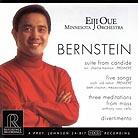August 1999
Starting with the Candide pieces, Bernstein shows that his skills as a composer are highly underrated. The Overture is both beautiful and beautifully played, but the Suite, arranged by Bernstein biographer, personal assistant and music editor Charlie Harmon, is the real find here. With the freedom to choose elements out of chronological order, Harmon has assembled a piece that flows with drama and from one lyrical peak to another. With dynamic as well as melodic elegance the piece moves from its opening to a waltz, through several lyrical passages to the slow central piece built on The Ballad of Eldorado. With an emphasis on the Spanish numbers in the middle sections, the suite picks up speed, dies away in a horn solo and then resolves with the lovely "Make Our Garden Grow" tune. The overall effect is quite captivating and creates a vivid, well-realized whole. One reason has to be the melodic gifts of Bernstein, but of equal importance is the playing of the Minnesota Orchestra. Showing world-class ability, they handle the changing rhythms, tempos and tunes of the Suite with the skill of an F1 driver. The selections from the Mass are moving, with Anthony Ross’ cello work reproduced with great beauty. These three pieces are my favorite on the disc. Capturing the universal spiritual ache and desire for redemption and meaning, they deserve much wider attention. At just short of 18 minutes total time, they create longing, fear, hope and resolution -- not to mention being superbly played. The Five Songs, written over a 30-year period, demonstrate that Bernstein’s gift for melody was not confined to the Broadway stage or to a particular timeframe. Mezzo-soprano Beth Clayton extracts depth from the anti-war "So Pretty" and unsurpassing beauty in the two love songs,"Extinguish My Eyes" and "When My Soul Touches Yours," both English translations of poetry by Rainer Maria Rilke. The concluding Divertimento for Orchestra is the most varied and weakest piece. Meant to demonstrate all the facets of the orchestra, it succeeds in that mission but fails to hold together as a single work. Several selections have moments, but others, such as the "Turkey Trot," escape me completely and fail to fit into their surroundings. Still, the Minnesota Orchestra plays with consummate skill, and the sections that work do so to great, if brief, effect. So, a worthwhile set of music. The Suite works very well indeed, the Mass selections are deeply moving as are the songs. Sonically, the disc is a treat. The drums at about the six-minute mark of the Candide Suite are perfectly captured and reveal the size of the recording venue with exactness. String tone is pure, sweet and highly detailed. Horns have bite and brass warmth. Clayton, the soloist in the Five Songs, is well served, with each catch, trill and vocalization delivered directly to the listening room. But perhaps the best sonic treat of all is the dynamic range of the recording. Crescendos are scaled perfectly. Large-scale jumps, such as those that open the final meditation from the Mass, do exactly that, and without compression or shrinking the stage. In every sonic way, this is a recording the equal of the justly praised Reference Recordings Bruckner 9th [RR-81CD]. GO BACK TO: |
 Bernstein - Overture and
Suite from Candide, Five Songs, Three Mediations from Mass, Divertimento
for Orchestra
Bernstein - Overture and
Suite from Candide, Five Songs, Three Mediations from Mass, Divertimento
for Orchestra![[Reviewed on CD]](../format/regcd.gif) For any
one of several achievements -- his conducting career, being the first American conductor
of the NYPO, or his landmark TV series on the orchestra -- Leonard Bernstein would have
become an icon. That he did all of these and also composed speaks to his
voluminous spirit and appetites. While his composing career is usually defined by the
music to West Side Story and the soundtrack to On The Town, Bernstein
composed many other pieces. This, the second-most recent Reference Recordings release,
includes the Overture and Suite from the Broadway show Candide, an extract of his
1971 Mass, the premiere recording of Five Songs, and his Divertimento for
Orchestra, composed for the 100th anniversary of the Boston Symphony Orchestra in 1980.
For any
one of several achievements -- his conducting career, being the first American conductor
of the NYPO, or his landmark TV series on the orchestra -- Leonard Bernstein would have
become an icon. That he did all of these and also composed speaks to his
voluminous spirit and appetites. While his composing career is usually defined by the
music to West Side Story and the soundtrack to On The Town, Bernstein
composed many other pieces. This, the second-most recent Reference Recordings release,
includes the Overture and Suite from the Broadway show Candide, an extract of his
1971 Mass, the premiere recording of Five Songs, and his Divertimento for
Orchestra, composed for the 100th anniversary of the Boston Symphony Orchestra in 1980.